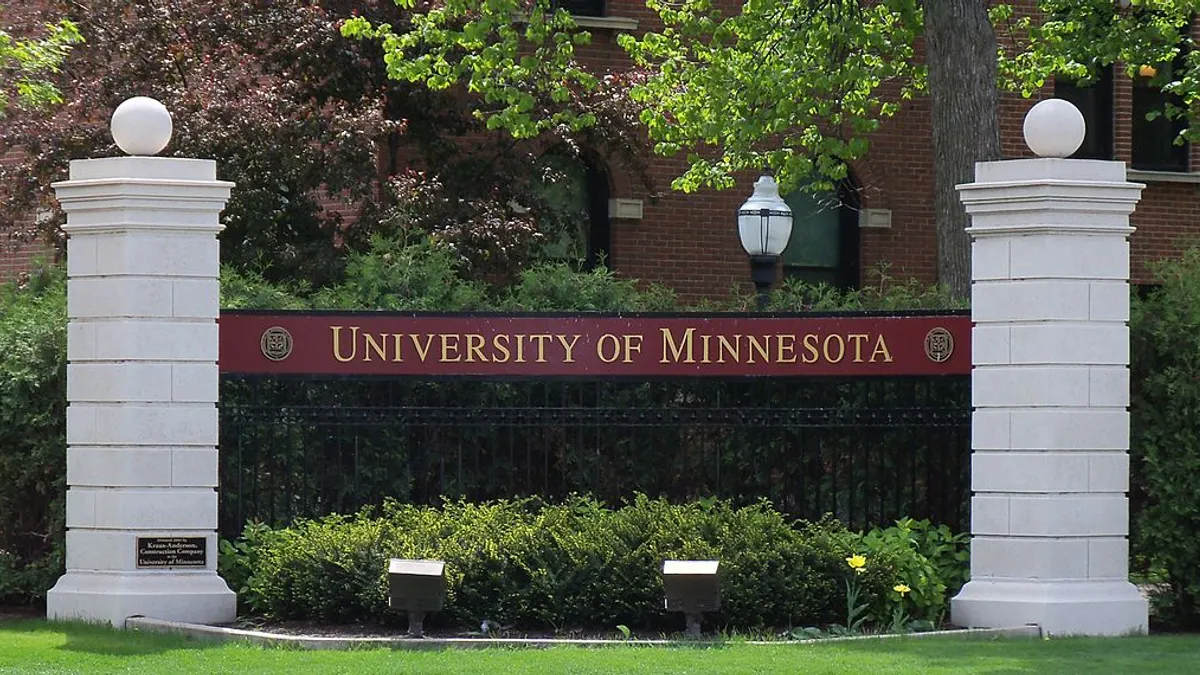UPDATE: Jan. 15, 2018: The University of North Carolina System Board of Governors is giving UNC-Chapel Hill Chancellor Carol Folt until Jan. 31 to leave her post after she announced yesterday she planned to step down at the end of the academic year. Board Chair Harry Smith told reporters Tuesday that the decision to truncate her departure "is not punitive in any shape, form or fashion" for her parting order to remove the pedestal of the contentious Silent Sam statue on her campus. "She resigned, we accepted it, we just felt it was better to compress the timeline and then work more towards a healing process," he said.
Dive Brief:
- Carol Folt, chancellor of the University of North Carolina at Chapel Hill, announced Monday that she will step down at the end of the academic year. She began in the role in 2013.
- In a statement posted to the university's website, Folt made clear her position in the debate over the Silent Sam Confederate statute, which was toppled in August. She ordered the immediate removal of its pedestal and descriptive tablets, citing safety concerns.
- Smith said in a statement Monday that the board was not aware of Folt's plans to step down prior to the public announcement and was in a closed meeting "to deliberate issues relating to UNC-Chapel Hill's leadership" when she tendered her resignation.
Dive Insight:
Folt's news follows UNC System President Margaret Spellings' recent announcement that she plans to depart on March 1, just three years into her five-year contract. Both leaders faced controversy during their tenures, including a lawsuit over a since-repealed state law that dictated what bathrooms transgender people could use and rising tensions over Silent Sam.
The debate over whether a public university (or any university at all) should have a monument to soldiers who died fighting for the Confederacy during the Civil War — and located at a campus entrance — came to a head the evening before fall classes started on the Chapel Hill campus when a crowd of some 200 people pulled it down. The move suggested people weren't willing to wait any longer for the university to take action.
The previous August, hundreds gathered at the statue in the aftermath of a white supremacist rally in Charlottesville, Virginia, that left one dead. They pressed the university to remove or relocate the statue, saying it symbolized the racism that spurred the rally. Protests escalated through the 2017-18 academic year.
Since the statue was taken down, the debate has shifted to what to do with it.
UNC-Chapel Hill's Board of Trustees and Folt presented one option in December, which the system's governors rejected, citing costs and safety concerns. In it, they called for the construction a $5.3 million history center at the edge of campus to house the statue. Folt and the board said they'd prefer the statue not stay on campus but were limited by a 2015 state historic preservation law.
The proposal also spurred dozens of teaching assistants and instructors to strike.
The governors set a new deadline of March 15 and said they'd work with Folt and the trustees to come up with an alternative plan. Moving ahead to take down the base and tablets — symbolically nixing the option of returning Silent Sam to its original post on campus — was viewed by the board as a move to thwart its own plans.
"We are incredibly disappointed at this intentional action," Smith said in the statement. "It lacks transparency and it undermines and insults the Board's goal to operate with class and dignity. We strive to ensure that the appropriate stakeholders are always involved and that we are always working in a healthy and professional manner."
The pedestal and tablets were removed overnight.
Overnight, workers removed the base and tablets from the Confederate Monument site. I am confident this is the right decision for our community – one that will promote public safety, enable us to begin the healing process and renew our focus on our great mission.
— Carol Folt (@ChancellorFolt) January 15, 2019
Smith said the governors' plan for determining what to do with the monument and the March deadline "remains unchanged."
Several Chapel-Hill trustees, however, hailed Folt's move. "We support her decision to remove intact the base of the Confederate monument and accept her decision to step down from her position," three board members wrote in a statement. "The chancellor has ultimate authority over campus public safety, and we agree Chancellor Folt is acting properly to preserve campus security."
In her statement, Folt said the base and pedestal's presence posed "a continuing threat both to the personal safety and well-being of our community and to our ability to provide a stable, productive educational environment," adding that "threats have continued to grow" since the university made its proposal to the governors.
"While I recognize that some may not agree with my decision to remove the base and tablets now, I am confident this is the right one for our community — one that will promote public safety, enable us to begin the healing process and renew our focus on our great mission," she said.
Smith told reporters that the board "would have loved to have had the conversation" about the decision to remove the pedestal and tablets and said the board has "an obligation to operate in total transparency," he said.
"It's a bit stunning based on how this has gone that UNC-Chapel Hill felt they needed to take that kind of draconian action, and I think that's what it is," Smith said. "When you start scheduling cranes at night and key stakeholders aren't involved, it's just unfortunate."
The system now has several leadership posts open at a time when college executive roles are increasingly hard to fill: system president and chancellor posts at UNC-Chapel Hill and Western Carolina University.







